

Filmmakers. Parts[edit] Film production consists of five major stages:[1]
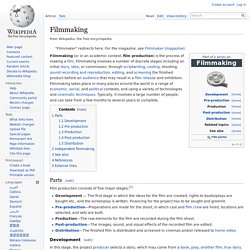
Steven Spielberg. George Lucas. George Walton Lucas (born May 14, 1944) is an American film director, screenwriter, producer, and entrepreneur.
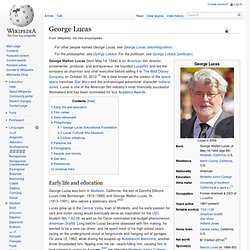
He founded Lucasfilm and led the company as chairman and chief executive before selling it to The Walt Disney Company on October 30, 2012.[3] He is best known as the creator of the space opera franchise Star Wars and the archaeologist adventurer character Indiana Jones. Lucas is one of the American film industry's most financially successful filmmakers and has been nominated for four Academy Awards. Early life and education George Lucas was born in Modesto, California, the son of Dorothy Ellinore Lucas (née Bomberger; 1913–1989) and George Walton Lucas, Sr. (1913–1991), who owned a stationery store.[4][5] After graduating with a bachelor of fine arts in film in 1967, he tried joining the United States Air Force as an officer, but he was immediately turned down because of his numerous speeding tickets. Film career Lucas at the Venice Film Festival in 2009. J. J. Abrams. Many of the films he has directed or produced are distributed by Paramount Pictures, while his television series were co-produced by either Warner Bros.
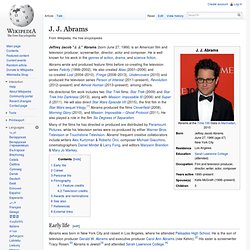
Television or Touchstone Television. Abrams' frequent creative collaborators include writers Alex Kurtzman & Roberto Orci, composer Michael Giacchino, cinematographers Daniel Mindel & Larry Fong, and editors Maryann Brandon & Mary Jo Markey. Early life[edit] Abrams was born in New York City and raised in Los Angeles, where he attended Palisades High School. Ridley Scott. Christopher Nolan. Christopher Jonathan James Nolan (/ˈnoʊlən/; born 30 July 1970)[1] is an British-American film director, screenwriter, and producer.
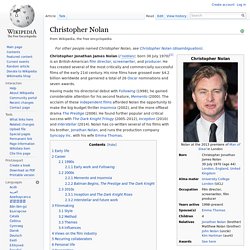
He has created several of the most critically and commercially successful films of the early 21st century. His nine films have grossed over $4.2 billion worldwide and garnered a total of 26 Oscar nominations and seven awards. Early life[edit] Nolan was born in London. His British father, Brendan James Nolan, was an advertising executive,[3] and his American mother, Christina (née Jensen), worked as a flight attendant and English teacher.[4][5][6] His childhood was split between London and Chicago, and he has both British and American citizenship.[7][8] He has an older brother, Matthew, and a younger brother, Jonathan.[9] Nolan began making films at age seven, borrowing his father's Super 8 camera and shooting short films with his action figures.[10][11] From the age of 11, he aspired to be a professional filmmaker.[9] Career[edit] James Cameron. Avatar (2009) Darren Aronofsky. Pi (1998. Réquiem por un sueño (2000. Requiem for a Dream. Alcoholics or drug addicts feel wrong when they don't feel right.
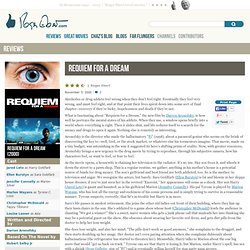
Eventually they feel very wrong, and must feel right, and at that point their lives spiral down into some sort of final chapter--recovery if they're lucky, hopelessness and death if they're not. What is fascinating about "Requiem for a Dream," the new film by Darren Aronofsky, is how well he portrays the mental states of his addicts. When they use, a window opens briefly into a world where everything is right. Then it slides shut, and life reduces itself to a search for the money and drugs to open it again. Nothing else is remotely as interesting.
The Fountain (2006. The Fountain. September 13, 2007 Cast & Credits Tomas/Tommy/Tom Creo: Queen Isabel/Izzi Creo: Dr. Guzetti: Father Avila: Grand Inquisitor: The Fountain. If Darren Aronofsky's "The Fountain" is an ambitious folly, that's hardly inappropriate because the movie itself is about one of humankind's most grandiose follies, the quest for eternal life.
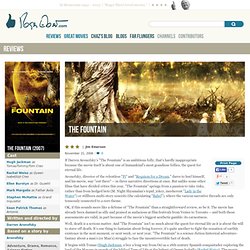
Aronofsky, director of the relentless "Pi" and "Requiem for a Dream," dares to hurl himself, and his movie, way "out there" -- in three narrative directions at once. But unlike some other films that have divided critics this year, "The Fountain" springs from a passion to take risks, rather than from hedged bets (M. Night Shyamalan's tepid, jokey, incoherent "Lady in the Water") or stillborn multi-story conceits (the calculating "Babel"), where the various narrative threads are only tenuously connected to a core theme.
OK, if this sounds more like a defense of "The Fountain" than a straightforward review, so be it. Well, death is a serious matter. Does that sound a little silly? Yes, "The Fountain" overreaches on every level, and that's exactly what I like about it. Black Swan (2010. The Wrestler (2008) Brad Bird. Phillip Bradley "Brad" Bird (born September 24, 1957) is an American director, screenwriter, animator, producer and actor.
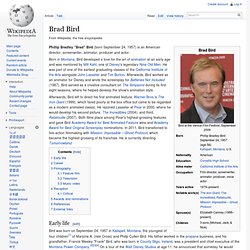
Early life[edit] Career[edit] On March 18, 2014, it was announced that Bird is writing a sequel to The Incredibles.[14] Filmography[edit] Feature film[edit] Television[edit] Music video[edit] Reception[edit] Hayao Miyazaki. Japanese animator, film director, and mangaka Hayao Miyazaki (宮崎 駿, Miyazaki Hayao, [mijaꜜzaki hajaꜜo]; born 5 January 1941) is a Japanese animator, director, producer, screenwriter, author, and manga artist.
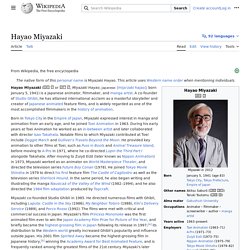
Nausicaä of the Valley of the Wind (1984. Castle in the Sky (1986. My Neighbor Totoro (1988. Kiki's Delivery Service (1989. Porco Rosso (1992. Ponyo (2008. Howl's Moving Castle (2004) Spirited Away (2001) The Secret World of Arrietty (2010. Princess Mononoke (1997. GhibliWiki. Peter Jackson. The Lord of the Rings: The Two Towers (2002. The Lord of the Rings: The Return of the King (2003. Steven Spielberg. A.I. Artificial Intelligence (2001.
The Lord of the Rings: The Fellowship of the Ring (2001. Agustín Calderón. Film Genre. In film theory, genre (/ˈʒɒnrə/ or /ˈdʒɒnrə/) refers to the method based on similarities in the narrative elements from which films are constructed.
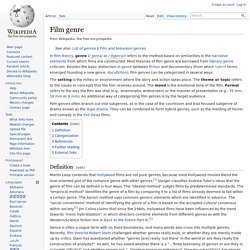
Most theories of film genre are borrowed from literary genre criticism. Besides the basic distinction in genre between fiction and documentary (from which hybrid forms emerged founding a new genre, docufiction), film genres can be categorized in several ways. Musicals. The musical film was a natural development of the stage musical after the emergence of sound film technology.
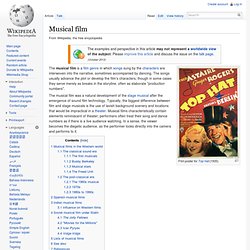
Typically, the biggest difference between film and stage musicals is the use of lavish background scenery and locations that would be impractical in a theater. Musical films characteristically contain elements reminiscent of theater; performers often treat their song and dance numbers as if there is a live audience watching. Chicago (2002. Themes. In contemporary literary studies, a theme is the central topic a text treats.[1] Themes can be divided into two categories: a work's thematic concept is what readers "think the work is about" and its thematic statement being "what the work says about the subject".[2] The most common contemporary understanding of theme is an idea or concept that is central to a story, which can often be summed in a single word (e.g. love, death, betrayal).
Exploitation. Exploitation is the use of someone or something in an unjust or cruel manner. Organizational or "micro-level" exploitation: most theories of exploitation center on the market power of economic organizations within a market setting. Some neoclassical theory points to exploitation not based on market power.Structural or "macro-level" exploitation: focuses on exploitation by large sections of society even (or especially) in the context of free markets. Marxist theory points to the entire capitalist class as an exploitative entity, and to capitalism as a system based on exploitation. Equanimity. Equanimity (Latin: æquanimitas having an even mind; aequus even animus mind/soul) is a state of psychological stability and composure which is undisturbed by experience of or exposure to emotions, pain, or other phenomena that may cause others to lose the balance of their mind. The virtue and value of equanimity is extolled and advocated by a number of major religions and ancient philosophies.
Hinduism[edit] According to the Bhagavad Gītā, every one can eventually achieve equanimity through spiritual practice leading to self realization.[1] TRON: Legacy (2010. The Secret World of Arrietty (2010. The Fountain (2006. Avatar (2009) Discrimination. Discrimination is the prejudicial treatment of an individual based on their actual or perceived membership in a certain group or category, "in a way that is worse than the way people are usually treated. "[1] It involves the group's initial reaction or interaction, influencing the individual's actual behavior towards the group or the group leader, restricting members of one group from opportunities or privileges that are available to another group, leading to the exclusion of the individual or entities based on logical or irrational decision making.[2] Discriminatory traditions, policies, ideas, practices, and laws exist in many countries and institutions in every part of the world, even in ones where discrimination is generally looked down upon.
In some places, controversial attempts such as quotas or affirmative action have been used to benefit those believed to be current or past victims of discrimination—but have sometimes been called reverse discrimination themselves. Racism. Some definitions consider that any assumption that a person's behavior would be influenced by their racial categorization is inherently racist, regardless of whether the action is intentionally harmful or pejorative, because stereotyping necessarily subordinates individual identity to group identity. District 9 (2009. The Help (2011) A.I. Artificial Intelligence (2001. Compassion. Hugo (2011) Nausicaä of the Valley of the Wind (1984. Trust. In a social context, trust has several connotations.[1] Definitions of trust[2][3] typically refer to a situation characterised by the following aspects: One party (trustor) is willing to rely on the actions of another party (trustee); the situation is directed to the future.
The Iron Giant (1999. Addiction. Réquiem por un sueño (2000. Artificial life. Ghost in the Shell (1995. A.I. Artificial Intelligence (2001. TRON: Legacy (2010. The Iron Giant (1999. Courage. Hugo (2011) Me. Me or ME may also refer to: In arts and entertainment Music Other Medicine. Martian Child (2007. Critics. Art criticism is the discussion or evaluation of visual art.[1][2][3] Movie reviews, essays and the Movie Answer Man from film critic Roger Ebert.